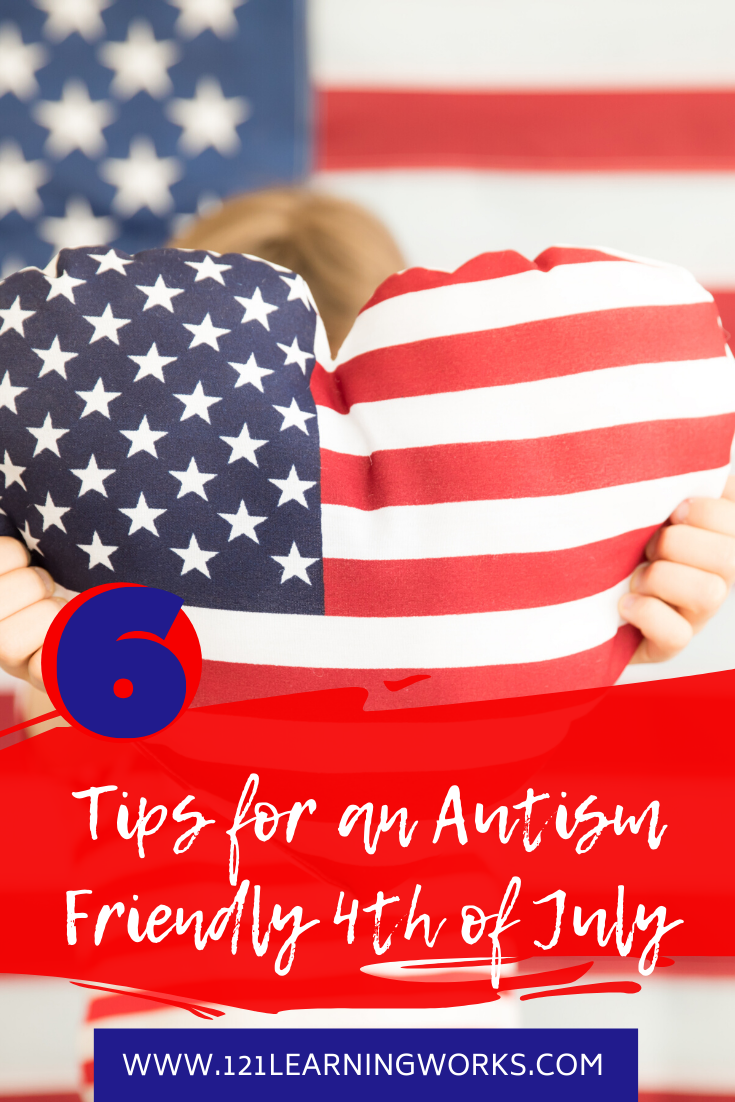How to Prepare for an Autism-Friendly 4th of July
The 4th of July is a wonderful holiday to celebrate with your family. It comes with interactive parades and fireworks, but also with crowds, smells, and smoke which can present challenges for children with autism. This doesn’t mean that you can’t enjoy this day together though. With some preparation, you can turn this holiday into a fun celebration!
We at 121 Learning Works are convinced that the 4th of July CAN be an autism-friendly holiday where your family can create wonderful memories together. Here are some tips to help you and your child prepare for an autism-friendly 4th of July.
6 Ways to Help You and Your Family Get Ready for an Autism-Friendly 4th of July
Communicate
As a parent of a child with autism, you know how important it is to prepare your child for what is to come. Talk together about the holiday and the activities a few days in advance. Explain that there will be loud and sudden noises, bright lights, smoke, and crowds of people. Show your child what the day looks like. Show pictures or videos of the activities and the fireworks to make the 4th of July a predictable day for your child.
2. Focus on the Positive
Show that you are excited about this holiday. This will help your child get excited as well. It is a good idea to focus on the 4th of July activities your child will enjoy. You can put your child in charge of an activity, such as to get the car ready or to pick the seating. This increases the feeling of being in control of the experience. It can also help to regulate their senses and make the 4th of July a joyful day for your child.
3. Plan
When you are planning the holiday, choose the activities that meet your family’s needs. Consider things like the expected crowds, the main attractions, and if you need to get in touch with the organizers for more information.
Involve your child in the plans and preparations. Plan together what the day will look like and give your child as many choices as possible. Doing this together will also help you to pick activities that are within your child’s limits
4. Practice
There will be situations on that day that your child is unfamiliar or uncomfortable with. Simulate those situations and practice possible reactions in advance. For example, practice how to react when people bump into your child or when he or she gets hugged unexpectedly.
If you are meeting others for lunch or dinner, you can stage how that looks and how to react when certain questions are asked. This way, your child has the opportunity to practice and prepare. Think about all the anticipatory fun that you will have together!
5. Make Arrangements
When you are preparing for the holiday, discuss a safe word or a gesture that your child can use when feeling uncomfortable. This will help your child to feel safe during the day.
Give your child a safe space that can be their own during the day’s activities and inform the people you are celebrating with about this space. Think of a pillow, a blanket, a chair, or a pop-up tent that can be used as an escape from the noise and people.
If you are attending an activity, it is a good idea to arrive on time or even earlier to pick a good spot before it gets too crowded. Despite all preparations, your child might still have a difficult time. You can always agree to look for calmer areas or leave altogether.
6. Pack Distractions
Bring one or two of your child’s favorite items to the activities. This can function as a reminder of something familiar and could ease your child in unfamiliar situations. Something familiar can distract in stressful situations or when waiting for an activity. Think about a favorite toy, game, or book that your child can pick. A snack can also work as a good distraction.
Also, consider items that will reduce sensory overload. Sunglasses or hats can help manage your child’s visual stimulation. To lessen auditory stimulation, earplugs, noise-canceling headphones, or earbuds that can play some of their favorite music may be helpful. Talk together about the options, empower your child to pick their desired items, and practice with them ahead of time.
To prepare for an autism-friendly 4th of July, we recommend you:
communicate
focus on the positive
plan
practice
make arrangements
pack distractions
These tips will help you to create holiday fun for you and your family!
Let’s talk!
CLICK HERE to schedule a free consultation with one of our behavior specialists and learn more. Happy 4th of July to you and your family on behalf of everyone at 121 Learning Works!

